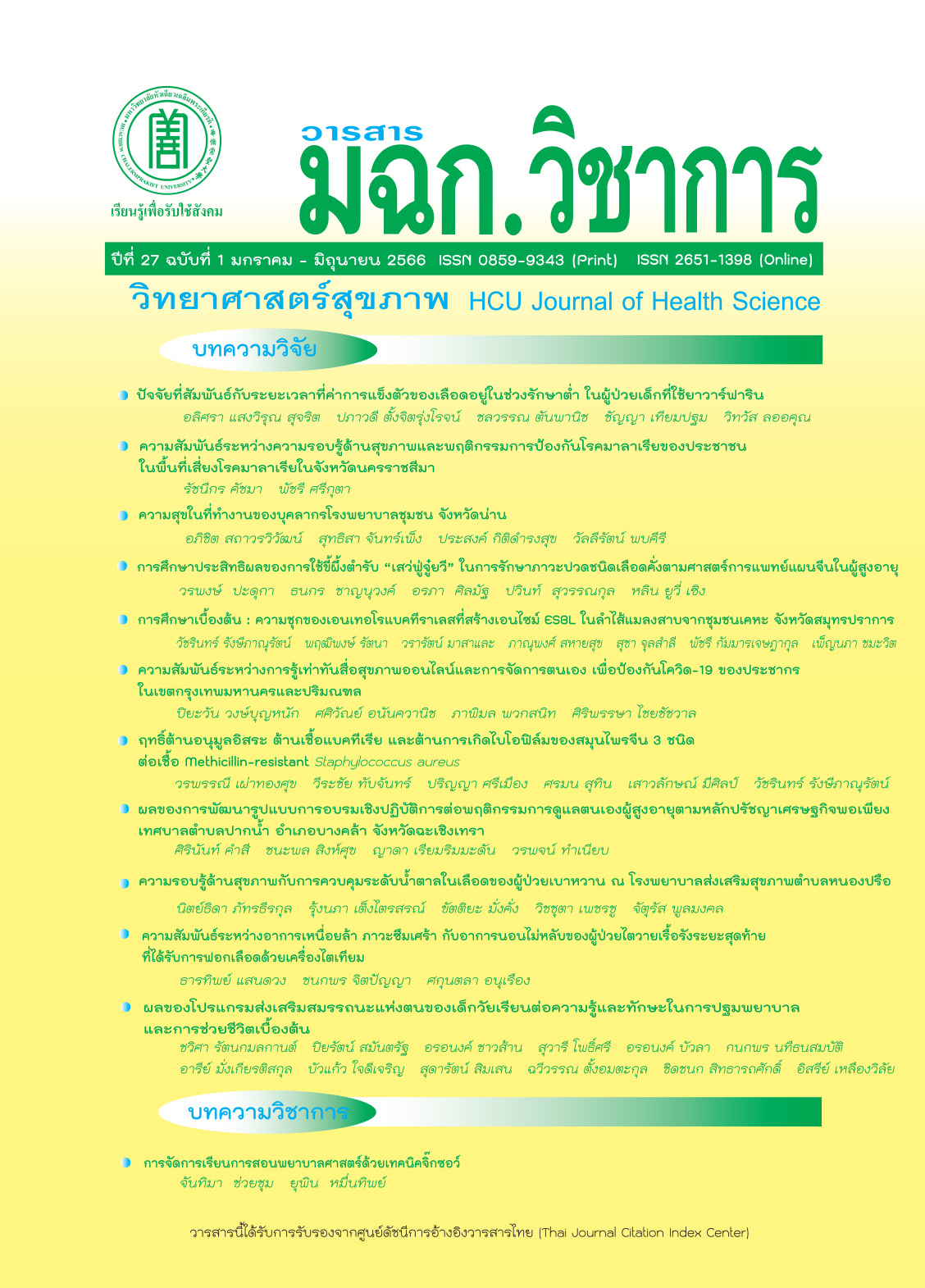The The Efficacy of Chinese Herbal Wax for Pain Reduction in Elderly Patients with Blood Stasis Syndrome
Keywords:
chinese herbs, medicinal formula “Xue Fu Zhu Yu” congestive pain, elderly patientsAbstract
This research study aimed to study the efficacy of Chinese herbal ointments for treating chronic pain, especially pain in the elderly in Bang Chalong Subdistrict, Bang Phli District, Samut Prakan Province, using the formula "Xue Fu Zhu Yu" by a two-group comparison study. Data were collected before and after the experiment (clinical control-trial group). The groups consisted of elderly people in Bang Phli District in Samut Prakan Province. Those diagnosed by traditional Chinese medicine were among 67 patients with thrombophlebitis, including 34 females and 33 males. In the experimental group there were 18 females and 15 males and a total of 33 cases: mean age 66.81 years, mean body mass index (BMI) 24.47 kg/m2, and in the control group: 16 females, 18 males, total 34 cases, mean age 68.35 years, mean body mass index (BMI) 24.31 kg/m2. Both groups received 1 jar of herbal ointment each, applied and lightly massaged to the affected area twice daily (morning and bedtime) for a period of one week. Evaluation was done by using a record form.
The results showed that there was no statistically significant difference in age, body mass index, work activity, and pain before treatment between the two groups (p>0.05 ). There was a statistically significant difference in pain reduction (p<0.05 ) in the experimental group within one week, and there was no statistically significant difference in pain before and after treatment (p>0.05 ) Comparison of syndromes in Chinese medicine found that there were no statistically significant differences between the two groups before and after treatment (p>0.05 ).
Downloads
References
Department of Economic and Social Affairs. The aging of populations and its economic and social implications. New York: United Nations; 1956.
Malee S. Know the elderly society and the situation of the elderly (in Thailand). Office of the Civil Service Commission. 2018;60:5-6.
Marengoni A, Winblad B, Karp A, Fratiglioni L. Prevalence of chronic diseases and multimorbidity among the elderly population in Sweden. American J. of Public Health 2008;98(7):1198-200.
Richards BL, Whittle SL, Buchbinder R. Muscle relaxants for pain management in rheumatoid arthritis: Cochrane. Database Syst Rev 2012;1:CD008922.
Chou R, Peterson K, Helfand M. Comparative efficacy and safety of skeletal muscle relaxants for spasticity and musculoskeletal conditions: a systematic review. J Pain Symptom Manage 2004;28(2):140-75.
Xiao M, Liu L, Tumilty S, Liu D, You Y, Chen Y. Efficacy and safety of Chinese herbal footbaths for the treatment of dysmenorrhea: Protocol for a systematic review and meta-analysis. PLoS One 2021;16(5):e0250685.
Yu S, Wen Y, Xia W, Yang Y, Lv Z, Li X, et al. Acupoint herbal plaster for patients with primary dysmenorrhea: study protocol for a randomized controlled trial. Trials 2018;19(1):348.
National Statistical Office. Demography Population and Housing Statistics [Internet]. Bangkok: Office; 2021 [cited 2021 November 16].Available from: http://statbbi.nso.go.th/staticreport/page/sector/th/01.aspx
Samut Prakan Social Development and Human Security Office. Statistics of the Thai elderly in 2021 [Internet]. Samut Prakan: Office; 2021 [cited 2021 November 20]. Available from: https://dop.go.th/download/knowledge/th1663828576-1747_1.pdf
Sun G. Basic theory of traditional Chinese medicine. Beijing: China Traditional Chinese Medicine Press; 2017.
Vichai C, Yenchij T, Chaowalid S, Charat T, Sawang K, et al. Commonly used Chinese prescription in Thailand volume 2. Bangkok: The office of the Veterans Printing Affairs Office under the Royal Patronage of His Majesty the King; 2008.
Jiqun X. Pharmacology of traditional Chinese medical formulae. Beijing: People's Medical Publishing House; 1995.
Peng K, Wang XD, Yuan XQ. Xue Fu Zhu Yu Tang. In: Xia M(ed). Modern Study of the Medicine Formulae in Traditional Chinese Medicine. Vol.2. 1st ed. Beijing: Xue Yuan Press; 1997.
Taechaarpornkul W, Suvapan D, Theppanom C, Chanthipwaree C, Chirawatkul A. Comparison of the effectiveness of six and two acupuncture point regimens in osteoarthritis of the knee. Acupunct Med 2009;27:3-8.
Phanpanich L. Pain in older people:complex problems and nursing management. Journal of Nursing Science and Health 2017;40(3):148-59.
Miller CA. Caring for older adults experiencing pain. In: Miller CA, editor. Nursing for wellness in older adults. 7th ed. New York: Lippincott Williams & Wilkins; 2015. p. 581-97.
McCarthy LH, Bigal ME, Katz M, Derby C, Lipton RB. Chronic pain and obesity in people: results from the Einstein aging study. J Am Geriatr Soc 2009;57(1):115-9.
Khamkong C, Piaseu N, Kittipimpanon K. Effects of weight control program using group and community support on nutritional status and knee pain in overweight older adults with knee pain. JNSCU 2017;29(3):8-18.
Okifuji A, Hare BD. The association between chronic pain and obesity. J Pain Res 2015;8:399–408.
Deguang C, Xiaoping W. Pharmacology of traditional Chinese medical formulae. Beijing: Tsinghua University Press; 2013.
Wang G. Xuefu Zhuyu Oral Liquid, a classic drug for activating blood and removing blood stasis. Jilin J Tradit Chinese Med 2004;24:62.
He HQ, Chen G, Gao J, Liu Y, Zhang CH, Liu C, et al. Capsule in the treatment of qi stagnation and blood stasis syndrome: a study protocol for a randomised controlled pilot and feasibility trial. Trials 2018 Sep21; 19(1):515.
Ling H. Effects of Xuefu Zhuyu decoction on the treatment of chest pain and heartache (stagnation of blood stasis). Clinical Research of Chinese Medicine 2016;8(26):57-8.
Chou YF. Therapeutic effect of modified Xuefu Zhuyu decoction in the treatment of dysmenorrhea with Qi stagnation and blood stasis. J Sichuan Tradit Chin Med 2015;33(5):117–8.
Wei W, Rong R, Qiang H, Lei X, Ben N. Clinical observation on the treatment of acute traumatic synovitis of the knee joint with Qi stagnation and blood stasis syndrome. Chinese Journal of Emergency Medicine 2018;27(2):338-40.
Downloads
Published
How to Cite
Issue
Section
License
Copyright (c) 2023 HCU Journal

This work is licensed under a Creative Commons Attribution-NonCommercial-NoDerivatives 4.0 International License.
บทความที่ได้รับการตีพิมพ์เป็นลิขสิทธิ์ของวารสารวิทยาศาสตร์สุขภาพและสุขภาวะ
ข้อความที่ปรากฏในบทความแต่ละเรื่องในวารสารวิชาการเล่มนี้เป็นความคิดเห็นส่วนตัวของผู้เขียนแต่ละท่านไม่เกี่ยวข้องกับมหาวิทยาลัยหัวเฉียวเฉลิมพระเกียรติ และคณาจารย์ท่านอื่นๆในมหาวิทยาลัยฯ แต่อย่างใด ความรับผิดชอบองค์ประกอบทั้งหมดของบทความแต่ละเรื่องเป็นของผู้เขียนแต่ละท่าน หากมีความผิดพลาดใดๆ ผู้เขียนแต่ละท่านจะรับผิดชอบบทความของตนเองแต่ผู้เดียว




